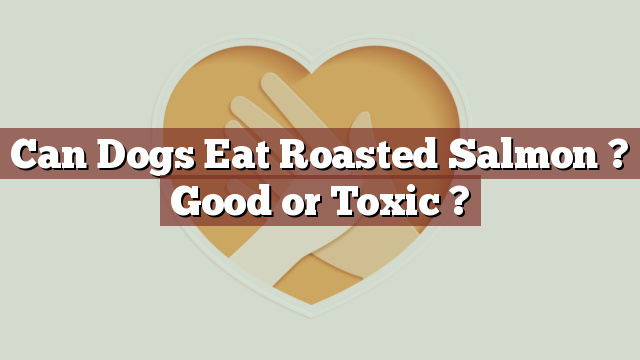Can Dogs Eat Roasted Salmon? Good or Toxic?
As pet owners, it’s important for us to be aware of what foods are safe for our furry friends to consume. Our canine companions have specific dietary needs, and it’s crucial that we provide them with a well-balanced and nutritious diet. One popular question that often arises is whether dogs can eat roasted salmon. In this article, we will explore the nutritional value of roasted salmon for dogs, discuss its safety, potential risks, and benefits, and provide guidance on what to do if your dog consumes roasted salmon.
Nutritional Value of Roasted Salmon for Dogs
Salmon is known for its high nutritional value, and this applies to both humans and dogs. It is an excellent source of protein, omega-3 fatty acids, vitamins D and B12, and minerals such as selenium and potassium. These nutrients are essential for maintaining a healthy immune system, promoting a shiny coat, supporting brain health, and aiding in proper organ function.
Is Roasted Salmon Safe or Toxic for Dogs?
Yes, roasted salmon is safe for dogs to consume. However, there are a few important factors to consider. Firstly, it is crucial to ensure that the salmon is properly cooked, without any seasoning or additives, as some ingredients commonly used in human cooking can be harmful to dogs. Secondly, moderation is key. While salmon is nutritious, it should be offered as an occasional treat or part of a balanced diet, rather than a staple food. Lastly, it is essential to remove any bones from the salmon before feeding it to your dog, as bones can pose a choking hazard or cause internal injuries.
Potential Risks and Benefits of Dogs Eating Roasted Salmon
When fed in moderation and prepared correctly, roasted salmon can offer several health benefits to dogs. The omega-3 fatty acids found in salmon have anti-inflammatory properties, which can help reduce joint pain and inflammation in dogs with arthritis. The high protein content supports muscle development and repair. Additionally, the vitamins and minerals present in salmon contribute to overall health and well-being.
However, there are some risks associated with feeding roasted salmon to dogs. One concern is the presence of parasites, such as tapeworms or roundworms, which can be found in raw or undercooked fish. Proper cooking eliminates this risk. Another concern is the potential for mercury contamination in certain types of fish, including salmon. It is recommended to choose salmon from reputable sources to minimize this risk.
What to Do if Your Dog Eats Roasted Salmon
If your dog accidentally consumes roasted salmon, there are a few steps you can take. Firstly, assess the situation. Was the salmon properly cooked and free of any harmful seasonings? Are there any bones present? If the salmon was prepared safely, there is likely no cause for immediate concern. However, if your dog exhibits any unusual symptoms such as vomiting, diarrhea, or difficulty breathing, it is important to contact your veterinarian for further guidance.
Conclusion: Should Dogs Eat Roasted Salmon?
In conclusion, dogs can safely eat roasted salmon as part of a balanced diet. It provides valuable nutrients and health benefits when prepared and served correctly. However, it is crucial to cook the salmon thoroughly, avoid seasoning or additives, remove any bones, and feed it in moderation. If you have any doubts or concerns, it is always best to consult with your veterinarian for personalized advice. By being knowledgeable about safe food options for our dogs, we can ensure their overall well-being and happiness.
Thank you for investing your time in exploring [page_title] on Can-Eat.org. Our goal is to provide readers like you with thorough and reliable information about various dietary topics. Each article, including [page_title], stems from diligent research and a passion for understanding the nuances of our food choices. We believe that knowledge is a vital step towards making informed and healthy decisions. However, while "[page_title]" sheds light on its specific topic, it's crucial to remember that everyone's body reacts differently to foods and dietary changes. What might be beneficial for one person could have different effects on another. Before you consider integrating suggestions or insights from "[page_title]" into your diet, it's always wise to consult with a nutritionist or healthcare professional. Their specialized knowledge ensures that you're making choices best suited to your individual health needs. As you navigate [page_title], be mindful of potential allergies, intolerances, or unique dietary requirements you may have. No singular article can capture the vast diversity of human health, and individualized guidance is invaluable. The content provided in [page_title] serves as a general guide. It is not, by any means, a substitute for personalized medical or nutritional advice. Your health should always be the top priority, and professional guidance is the best path forward. In your journey towards a balanced and nutritious lifestyle, we hope that [page_title] serves as a helpful stepping stone. Remember, informed decisions lead to healthier outcomes. Thank you for trusting Can-Eat.org. Continue exploring, learning, and prioritizing your health. Cheers to a well-informed and healthier future!

